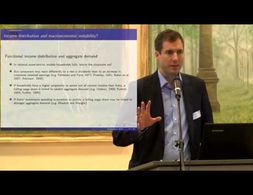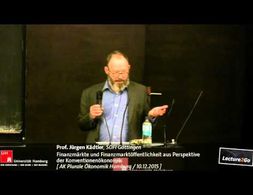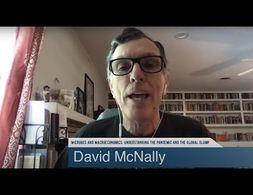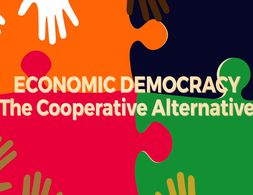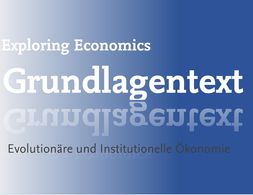1053 Ergebnisse
In this keynote lecture during the conference „The Spectre of Stagnation? Europe in the World Economy“, Till van Treek presents research on how changes in income distribution lead to macroeconomic instability and crisis, focusing on currents accounts. Treek presents the relative income hypothesis in contrast to other mainstream and Post-Keynesian explanations. The relative income hypothesis proposes that aggregate demand increases and savings decrease with rising personal income inequality due to upward looking status comparison – but effects depend on the quantile where income inequality increases. Treek points to the importance of accounting for both income and functional income distribution and underlines his arguments with data comparing different pattern in Germany and the U.S.
Prof. Kädtler (Soziologe) betrachtet die Kapitalismusform des "Finanzmarktkapitalismus" aus soziologischer Perspektive, im besonderen aus Sicht der Konventionenökonomik. Nach Einführungen in (a) Finanzmärkte, (b) Finanzialisierung und Finanzmarktkapitalismus (ab 9:30) sowie (c) Formationstheorien und „Cultural Economy"-Ansätze (u.a. Konventionenökonomik) (ab 16:00), liegt der Schwerpunkt der Analyse darauf, (d) mithilfe der Konventionenökonomik zu erklären, wie ein System des Finanzmarktkapitalismus entstehen konnte (ab 38:00). Kurz geht der Vortragende am Ende der Frage nach, warum sich die Situation auch nach der globalen Finanzkrise nicht geändert hat. Der Vortrag bietet einen interessanten ersten Einblick in die soziologische Perspektive auf Finanzmarktkapitalismus. Die Hauptanalyse und die Anwendung der Theorie an praktischen Beispielen ist eher kurz gehalten, allerdings werden relevante Schulen und Autoren genannt, die weiter recherchiert werden können.
The dossier explores the nature of care work and the gendered constructions and dichotomies that are associated with it. Drawing from feminist analysis the double burden, the undervaluation of feminised labour, the commodification of affective labour and the remittance economy are inquired into. Moreover, it is discussed how welfare regimes rely on the different organization of care work.
How did economic growth become paramount as the public policy objective? Peter Victor discusses the role of growth within institutions, asks if it is possible to imagine a degrowth economy and discusses the role of grass-root movements.
Mit digitaler Transformation geht in vielen Bereichen ein Aufbrechen von bestehenden Strukturen einher. Suchmaschinen vermitteln einen offeneren Zugang zu Wissen, in sozialen Netzwerken entstehen neue digitale Öffentlichkeiten und digitale Plattformen eröffnen neue Formen von (Sharing) Economy.
In this blog article Steve Keen elaborates on flawed climate change modelling and mainstream economics forecasts. In specific, he stresses the climate change forecasts of the DICE model (“Dynamic Integrated model of Climate and the Economy”) by Nobel Memorial Prize in Economic Sciences winner William Nordhaus.
In this episode of Jacobin radio, James K. Galbraith elaborates on the economic policies for the corona crisis, and Aaron Benanav on the crisis of unemployment. James K Galbraith also discusses why the economy as currently organized has been unable to deal with the challenges of the pandemic.
In this virtual teach-in, radical economists David McNally (author of the essential Global Slump) and Hadas Thier (author of the forthcoming A People’s Guide to Capitalism) will try to help activists make sense of the twists, turns, and sudden collapses in the world economy that have been playing out in the background during this global health emergency.
Fighting Neoliberalism with Keynes & Minsky? Riccardo Bellofiore proposes to revise the insights of Minsky's financial instability hypothesis, combining it with the Keynesian theory of the monetary circuit to answer many questions in modern economy.
Beyond Growth is a collection of educational materials offering a reflection on growth. It was created as a joint project of the associations Fairbindung e. V. and Konzeptwerk Neue Ökonomie, both based in Germany. The page provides learning materials and methods to stimulate thinking about the conditions of our current economy as well as possible alternatives.
The authors analyse the role and effects of the US dollar as factual global reserve currency. They demonstrate that a flight into the dollar creates adverse effects for the global economy as it represents a tightening of financial conditions.
In this piece Alexander Kravchuk gives an overview over the history of dept dependency in Ukraine, highlighting especially the role of international creditors and the negative socio-economic impacts of debt dependency for the Ukrainian economy.
"Could a cooperative market economy, in which firms are owned and controlled by their workers, be a viable and efficient alternative to capitalism?"
Understanding the American stock market boom and bust of the 1920s is vital for formulating policies to combat the potentially deleterious effects of busts on the economy.
Winner of the Nobel Prize in Economics
Get ready to change the way you think about economics.
Get ready to change the way you think about economics.
Nobel laureate Richard H. Thaler has spent his career studying the radical notion that the central agents in the economy are humans--predictable, error-prone individuals. Misbehaving is his arresting, frequently hilarious account of the struggle to bring an academic discipline back down to earth--and change the way we think about economics, ourselves, and our world.
"First published more than a decade ago, Globalizing Capital has remained an indispensable part of economic literature. This classic book emphasizes the importance of the international monetary system for understanding the international economy. The second edition, published in October 2008, has consistently appeared on syllabuses since its release
Stratification economics is defined as a systemic and empirically grounded approach to addressing intergroup inequality. Stratification economics integrates economics, sociology and social psychology to distinctively analyze inequality across groups that are socially differentiated, be it by race, ethnicity, gender, caste, sexuality, religion or any other social differentiation.
Dependency in Central and Eastern Europe - Self-reliance and the need to move beyond economic growth
In this essay, the author takes a critical perspective on the pursuit of growth as the solution for providing for environmental sustainability and economic stability in the countries of Central and Eastern Europe.
Drawing from the framework of dependency theory and presenting brief insights into European core-periphery relations the author then argues for the implementation of an alternative strategy to development that is built around the concept of self-reliance.
Complexity economics focuses on interactions and interdependencies between individuals and structures in economic systems. Those are systems of organised complexity. High importance is given to the analysis of networks.
Der Fokus der Komplexitätsökonomik liegt auf den Interaktionen und Wechselwirkungen zwischen Individuen und Strukturen wirtschaftlicher Systeme. Diese werden als Systeme organisierter Komplexität aufgefasst. Ein besonderes Augenmerk liegt auf der Analyse von Netzwerken.
What are the debates, feminist and otherwise, surrounding the phenomena of globalization? How does a gendered lens complicate our understandings of neoliberal globalization? How are particular labor regimes integral to global restructuring, and how are these gendered? What are the implications of global restructuring for bodies, identities, relations, and movements?
Der Fokus der feministische Ökonomik liegt auf dem wechselseitigen Zusammenhang von Geschlechterverhältnissen und Ökonomie. Sie rückt insbesondere Care und die teils nicht marktvermittelte Reproduktionssphäre in das Blickfeld.
In this essay the authors take a look at how welfare could be provided in a degrowth society.
In der Lehrveranstaltung „Plurale Feministischen Ökonomie“ erhalten die Studierenden einen Einblick in die unterschiedlichen Debatten innerhalb der Feministischen Ökonomie, die von der Subsistenztheorie bis hin zur Queer Economics reichen, und lernen die wissenschaftstheoretischen, normativen und methodischen Hintergründe kennen.
As tax day approached, St. Francis College Economics Professors launched their first Economics Week with three days of guest speakers and student research. Randall Wray explains some basic principles of Modern Monetary Theory.
Health Economics traditionally involves two distinct strands. One focuses on the application of core neoclassical economic theories of the firm, the consumer and the market to health-seeking behaviour and other health issues. It suggests a role for government intervention only in the case of specific market failures (for example externalities, asymmetric information, moral hazard, and public goods) that distort market outcomes. The second strand is evaluation techniques, used to assess the cost effectiveness of competing health interventions.
Die Evolutionäre und Institutionelle Ökonomie ist ein ökonomisches Paradigma, in welchem sozialer und ökonomischer Wandel eine zentrale Bedeutung einnehmen. In dieser heterodoxen Rolle außerhalb des wirtschaftswissenschaftlichen Mainstreams sehen einige die Evolutionsökonomie als eine Teildisziplin der Wirtschaftswissenschaften, die sich mit dynamischen Aspekten wirtschaftlichen Austausches befasst; für andere stellt sie eine Revolution wirtschaftstheoretischen Denkens dar. (vgl. Berendt/Glückler: 13 f.) Die Institutionelle Ökonomie zeigt Erklärungsansätze für wirtschaftliche Prozesse auf und betont, dass diese nicht ausschließlich durch „individuelles Rationalverhalten“ geprägt werden. Die Notwendigkeit von Institutionen wird betont, da ein individuelles, rationales Verhalten zu einer negativen Beeinflussung der Gemeinschaft führen kann und somit die Lösung über Institutionen erfolgen muss. (vgl. Nee, 2005: 49 ff)
The Currency of Politics explains why only through greater awareness of the historical limits of monetary politics can we begin to articulate more democratic conceptions of money.
From the two premises that (1) economies are complex systems and (2) the accumulation of knowledge about reality is desirable, I derive the conclusion that pluralism with regard to economic research programs is a more viable position to hold than monism. To substantiate this claim an epistemological framework of how scholars study their objects of inquiry and relate their models to reality is discussed. Furthermore, it is argued that given the current institutions of our scientific system, economics self-organizes towards a state of scientific unity. Since such a state is epistemologically inferior to a state of plurality, critical intervention is desirable.
Neoclassical economics focuses on the allocation of scarce resources. Economic analysis is mainly concerned with determining the efficient allocation of resources in order to increase welfare.
What are the implications of the politics of "behavioural change"? Alexander Feldmann took a closer look for you on nudging and framing and if this is a legitimate instrument being used by the state to make us behave better in terms of our carbon footprint.
This paper starts with an evaluation of three common arguments against pluralism in economics: (1) the claim that economics is already pluralist, (2) the argument that if there was the need for greater plurality, it would emerge on its own, and (3) the assertion that pluralism means ‘anything goes’ and is thus unscientific. Pluralist responses to all three arguments are summarized. The third argument is identified to relate to a greater challenge for pluralism: an epistemological trade-off between diversity and consensus that suggests moving from a discussion about ‘pros’ and ‘cons’ towards a discussion about the adequate degree of plurality. We instantiate the trade-off by showing how it originates from two main challenges: the need to derive adequate quality criteria for a pluralist economics, and the necessity to propose strategies that ensure the communication across different research programs. The paper concludes with some strategies to meet these challenges.
Wir nutzen Cookies. Klicke auf "Akzeptieren" um uns dabei zu helfen, Exploring Economics immer besser zu machen!

